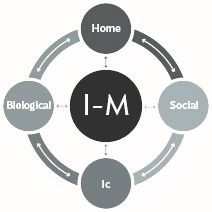Depression
Dysfunctional Family Week
If it's always someone else's fault you are never in control.
Posted December 21, 2014
This is Dysfunctional Family week

when families get together for the holidays. Just like suicide prevention week or mental health week, Dysfunctional Family week should have national recognition. Brothers and sisters, aunts and uncles, cousins, grandparents, matriarchs and patriarchs gather together to celebrate, and the fireworks can begin. Old wounds, unresolved conflicts, favorites and black sheep fill kitchens and living rooms. Fingers may get pointed, and blame served like hot figgy pudding.
But if it is always someone else’s fault you are never in control.
And if you are never in control you are always going to be angry, anxious, or sad.
Some people use drugs and alcohol to avoid these uncomfortable feelings. Some people eat, some gamble, some have promiscuous sex. But every time you use something to avoid a feeling you are just training your brain that you are not strong enough to deal with that feeling.
If you don’t think you are strong enough what happens to feeling angry, anxious, or sad? Those feelings get worse. And then your emotional, irrational part of the brain, the limbic system, says to you, “Hey! You know what to do to get rid of these feelings. Use. Use and we will feel great!”
Until the next time, when those feelings come back and you use again. And again. And again.
And one of those again times may be at the family reunion during Dysfunctional Family Week.
But as soon as you take responsibility you are in control.
Maybe your sister was favored, but was that really an excuse for skipping class in High School… to get high? Maybe your dad did spend a lot of time at work, but did that mean when he came home he deserved to be snubbed and ignored by you? Maybe your mom was not the best at balancing all the kids, but did that really give you an excuse to leave your room a mess, or embarrass her at the supermarket?
Taking responsibility may not be easy. In fact, it may be very, very hard. But it will give you a reward far beyond the transient, ephemeral reward of avoidance. As soon as you take responsibility you actually begin to feel better. You can forgive and be forgiven. You can see that everyone was doing the best they could in response to the influences in their lives.
You just need to start.
You can turn Dysfunctional Family Week to This Functional Family week.
If it’s always someone else’s fault you are never in control.

The Four Domains of the I-M
And even that is an I-M thing.


